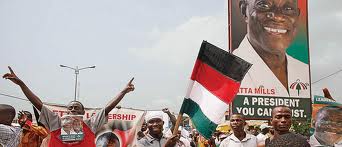I do not know how to come through with this article without frothing a little in the mouth. Kenya has had the election, elections in her mind since the turn of the New Year. Indeed it is paramount to note that campaigning in earnest started as early as 2011 and the dirty game and intrigues to succeed the outgoing President Mr. Mwai Kibaki started no sooner than Raila Odinga and Mwai Kibaki signed the National Accord in march 2008 that brought a halt to the violence and imbroglio that ensued after the December 2007, elections. Indeed the decibels of campaign noise were cranked up a few notches higher after the promulgation of the 2010 constitution. It estimated that Raila Odinga and Uhuru Kenyatta the two biggest protagonists in the 2013 election spent around 3.4m US$D in conservative estimates, this influx of liquidity in the Kenyan market placed extra pressure on the Kenyan shilling which hit its lowest point against major foreign currencies in January 2013.
The Kenyan election in itself has drained public resources in volumes. The March 4th 2013 exercise is said to be one of the most expensive elections exercise in the world. The march 4th election cost a whooping 24.9 Billion shillings which is three times more than the December 2007 general elections cost the Kenya tax payer. This in itself translates into 2000KSHs (25 US$D) per voter, which is higher than any other electoral exercise on record. Low electoral costs stand at between 1US$D and 3US$D according to the according to the Kriegler report and is characteristic of countries that have longer electoral experience like the USA and most Western European nations. Other countries in the developing world like; Chile 1.3 US$D, Costa Rica 1.8 US$D, Brazil 2.3US$SD in Latin America and Ghana 0.7 US$D, in Africa are all example of exemplars in prudent management of resources in general elections. The question that begs though is, why did the Kenyan election cost the Kenyan taxpayer so much? Administrative inefficiencies and blatant abuse of procurement regulations by the Interim Electoral Boundaries Commission meant that financial prudence was not at the heart of organizing this electoral process. This sad statistics are compounded by the fact that most of the frontrunners in the presidential election were and still are part of the executive arm of government, meaning that the possibility of the contestants drawing national resources for private campaigning was indeed very conspicuous. All these mandarins in high offices needed to do was order their charges or ‘worker bees’ if you may to increase the propensity to receive bribes, with monies accrued from abhorrent corruption finding way to the campaign kitties of the high and mighty.
Indeed one of the biggest impediments to African democracy is the patron-client relationship in African politics. Private entities that make explicit or at times implicit so called ‘donations’ in political courses expect returns and good returns at that once new or existing administrations are installed or maintained. The net effect of patron-clienteleism is that African governments cannot get rid of crony-ism which is responsible for the distortion of market forces, dynamics and perfect competition in African economies.
An important tool of looking into the effects of general elections to the economy is Security Exchanges. In Kenya, the NSE (Nairobi Securities Exchange) has been shown to lack immunity from the shocks and volatility that are generally correlated to politics in general and elections in particular. Studies1 have shown that in the market is lowest in the years just before general elections and in the election years themselves, this in itself shows that the market is not very vibrant.
What about the millions of man-hours lost by voters on queue to vote? What about the lull in economic activity in the period directly leading to and after the general election? Disruptions to supply of fresh produce market were rife; the horticulture industry which is dependent on flower exports to Western Europe was in limbo. Capital flight to neighboring countries was rampant as the elites took refuge in exotic destinations in pretext that they were taking holidays. The losses to the Kenyan hotel industry due to lack of sufficient bed occupancy are significant and could have a direct effect of pegging down economic growth so dependent on macro-political stability and tourist numbers.
Whereas the effects detailed in this article relate mainly to Kenya, there is no evidence to show that African elections more so in sub-Saharan Africa are indeed benign to national and economic stability. What Africa then needs to do is engage in institutional strengthening e.g. institutions, especially economic institutions like security exchanges that are impervious and fortified from immediate political distortions.
Alex Njeru wrote in from Kenya


